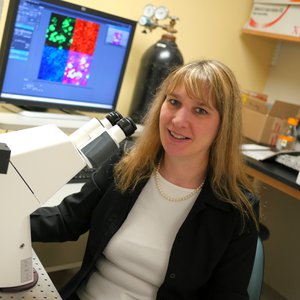Developmental Biology
The development of a complex, multicellular organism from a single-celled fertilized egg is a miraculous transformation that has been the subject of intense study for over a hundred years. The Developmental Biology research group consists of a diverse group of interactive faculty investigating a wide variety of development processes. We use several well-studied experimental organisms including invertebrates such as the soil nematode Caenorhabditis elegans and the fruitfly Drosophila melanogaster, vertebrates such as zebrafish (Danio rerio) and mouse (Mus musculus), and plants Populus and Arabipdosis, as well as the bacteria Myxococcus xanthus and Pseudomonas aeruginosa.
Specific aspects of development that are being studied include the role of chromatin remodeling in maintaining cell fate decisions, signal transduction mechanisms that control germline development, development and aging of the vertebrate nervous system, plant cell wall development and reproductive timing, and formation of bacterial biofilms.
The group uses a wide range of approaches—including imaging, genetics, molecular biology, and bioinformatics—to address important questions in the field. Members of our group interact with researchers from neighboring campuses in Syracuse that have a shared interest in developmental biology through monthly meetings of the Developmental Biology Interest Group.
Biology faculty members affiliated with Developmental Biology

Heather D. Coleman
Associate Professor
hcoleman@syr.eduPhone: 315.443.0453

Steve Dorus
Professor
sdorus@syr.eduPhone: 315.443.7091

Sarah E. Hall
Associate Professor
shall@syr.eduPhone: 315.443.2964

Heidi Hehnly
Renée Crown Professor in the Sciences and Mathematics and Associate Professor
hhehnly@syr.eduPhone: 315.443.2159

Li-En Jao
Associate Professor
ljao01@syr.eduPhone: 315.443.2615

Eun-Deok Kim
Assistant Professor
ekim112@syr.eduPhone: 315.443.8578

Katharine (Kate) Lewis
Professor
kelewi02@syr.eduPhone: 315.443.5902

Jessica MacDonald
Associate Professor, Interim Executive Director of Neuroscience, and Graduate Program Director of the Interdisciplinary Neuroscience Graduate Concentration
jemacdon@syr.eduPhone: 315.443.5837

Melissa E. Pepling
Professor and Chair
mepeplin@syr.eduPhone: 315.443.4541

Ramesh Raina
Professor and Executive Director of Biotechnology Program
raraina@syr.eduPhone: 315.443.4546

Roy D. Welch
Professor
rowelch@syr.eduPhone: 315.443.7197

Michele G. Wheatly
Professor of Biology, Former Provost
mwheatly@syr.eduPhone: 315.443.6123
